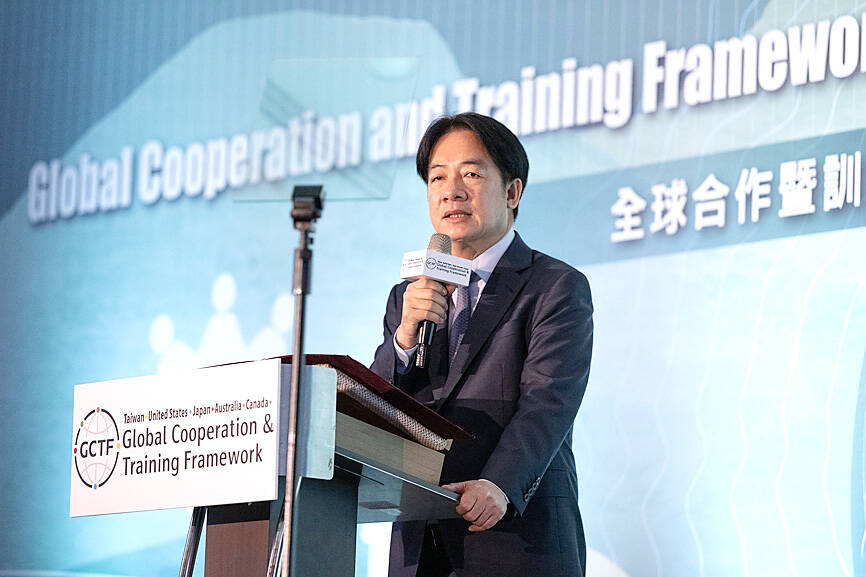Taiwan is committed to boosting whole-of-society resilience and sharing its experience with friends and allies via the Global Cooperation and Training Framework (GCTF), President William Lai (賴清德) told an event yesterday to mark the opening of a GCTF workshop in Taipei.
“Taiwan is both willing and able to contribute” to democracy, peace and prosperity, Lai said.
The GCTF is an organization comprising Taiwan, the US, Japan and Australia. Representatives from 30 nations attended this year’s workshop.

Photo courtesy of the Presidential Office via CNA
“Global challenges such as extreme weather, pandemics and energy crises continue to emerge, while growing authoritarianism presents a grave threat to freedom-loving countries,” Lai said, adding: “These challenges have no borders, and absolutely no single country can face them alone.”
Taiwan holds a strategically important position in the first island chain and stands at the forefront of the defense of democracy, he said.
“With this joint workshop, we are demonstrating to the world our determination to create an even more resilient Taiwan,” he said.
Lai outlined his administration’s plans to bolster social resilience, saying that establishing the Whole-of-Society Defense Resilience Committee as part of the Presidential Office would facilitate the coordination between central and local authorities during contingencies.
The committee’s remit includes civilian force training, material preparation, and key infrastructure operation and maintenance, among other crucial tasks, he said.
The initiative would bolster resilience in national defense, the economy, disaster prevention and democracy, the same issues as are on the workshop’s agenda, he said.
The committee last year held a large-scale tabletop exercise that involved senior central and local officials to test Taiwan’s ability to respond to “high-intensity gray zone operations and near-conflict situations,” Lai said.
The government is to continue holding exercises to improve the teamwork between central and local governments in dealing with contingencies, he said.
Taiwan will augment promote risk awareness, knowledge and skills to enable Taiwanese to organize themselves and help each other during an emergency, Lai said.
The American Institute in Taiwan (AIT) collaborated with the Taiwan Development Association for Disaster Medical Teams to train the public in giving first aid, he said.
An improved version of the program is already in practice, he said.
The government trained Disaster Response Volunteers for people aged 18 to 89 and formed Taiwan Community Emergency Response Teams at key facilities throughout the nation, he said.
Taiwan would leverage its strengths to contribute to the global community, as the nation has received help and inspiration from fellow GCTF members, he said.
The nation excels at information, communications and advanced technology, capabilities that would be used to improve cybersecurity, homeland security and the application of emerging technologies, he said.
Taiwan’s achievement in those fields would hopefully help other nations, Lai said.
AIT Director Raymond Greene told the event that helping Taiwan augment its resilience is a top priority of the US and has always been so.
The US hopes that this year’s workshop would facilitate dialogue, sharing of experience and cooperation between experts and leaders toward making Taiwan more resilient, Greene said.
Taiwan’s challenges are also the challenges of the US and the rest of the world, he said, adding that building resilience is a key to achieving peace and stability around the globe.
Additional reporting by Huang Ching-hsuan

Taiwan has received more than US$70 million in royalties as of the end of last year from developing the F-16V jet as countries worldwide purchase or upgrade to this popular model, government and military officials said on Saturday. Taiwan funded the development of the F-16V jet and ended up the sole investor as other countries withdrew from the program. Now the F-16V is increasingly popular and countries must pay Taiwan a percentage in royalties when they purchase new F-16V aircraft or upgrade older F-16 models. The next five years are expected to be the peak for these royalties, with Taiwan potentially earning

STAY IN YOUR LANE: As the US and Israel attack Iran, the ministry has warned China not to overstep by including Taiwanese citizens in its evacuation orders The Ministry of Foreign Affairs (MOFA) yesterday rebuked a statement by China’s embassy in Israel that it would evacuate Taiwanese holders of Chinese travel documents from Israel amid the latter’s escalating conflict with Iran. Tensions have risen across the Middle East in the wake of US and Israeli airstrikes on Iran beginning Saturday. China subsequently issued an evacuation notice for its citizens. In a news release, the Chinese embassy in Israel said holders of “Taiwan compatriot permits (台胞證)” issued to Taiwanese nationals by Chinese authorities for travel to China — could register for evacuation to Egypt. In Taipei, the ministry yesterday said Taiwan

Taiwan is awaiting official notification from the US regarding the status of the Agreement on Reciprocal Trade (ART) after the US Supreme Court ruled US President Donald Trump's global tariffs unconstitutional. Speaking to reporters before a legislative hearing today, Premier Cho Jung-tai (卓榮泰) said that Taiwan's negotiation team remains focused on ensuring that the bilateral trade deal remains intact despite the legal challenge to Trump's tariff policy. "The US has pledged to notify its trade partners once the subsequent administrative and legal processes are finalized, and that certainly includes Taiwan," Cho said when asked about opposition parties’ doubts that the ART was

If China chose to invade Taiwan tomorrow, it would only have to sever three undersea fiber-optic cable clusters to cause a data blackout, Jason Hsu (許毓仁), a senior fellow at the Hudson Institute and former Chinese Nationalist Party (KMT) legislator, told a US security panel yesterday. In a Taiwan contingency, cable disruption would be one of the earliest preinvasion actions and the signal that escalation had begun, he said, adding that Taiwan’s current cable repair capabilities are insufficient. The US-China Economic and Security Review Commission (USCC) yesterday held a hearing on US-China Competition Under the Sea, with Hsu speaking on